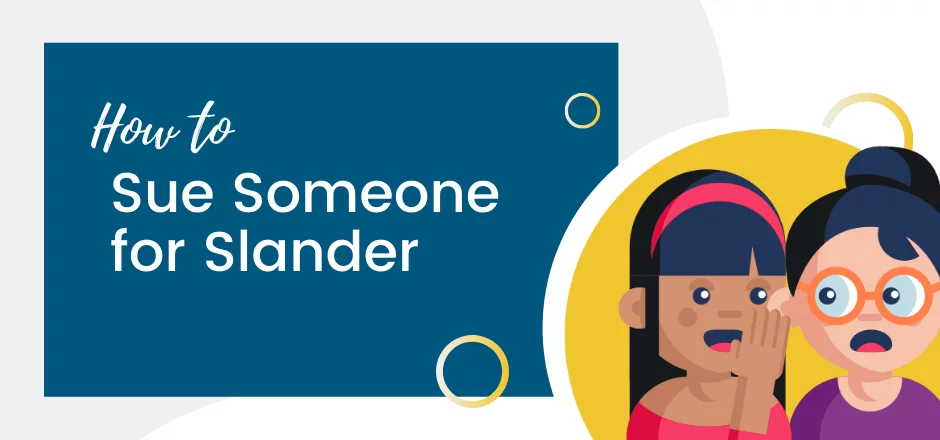How to Sue Someone for Slander
If you have experienced harm due to a defamatory statement, you may be interested in learning more about filing a lawsuit and pursuing compensation.
In this article, we’re taking a closer look at how to sue someone for slander.
How to Sue Someone for Slander
There is no law against holding strong opinions about another person in the United States. In fact, the ability to hold private beliefs is essentially enshrined under freedom of thought, conscience, and religion. The opinion doesn’t even need to be well-informed or factual; you still have the right to believe it.
When someone makes a false statement or spreads lies about you to at least one other person, freedom of thought no longer applies. Then, the statement becomes slander or defamation. This is especially true if the false statements shared cause you to experience some type of loss and/or harm.
In the state of California, you have the right to sue someone who negligently or maliciously makes false statements about you. However, slander cases are often notoriously challenging to navigate and even harder to win.
The Four Elements of Slander Lawsuits
Simply having someone share a lie about you isn’t necessarily enough to succeed in a slander lawsuit. This is true even if you have hard evidence that the false statement was untrue. Instead, you must be able to prove all of the following four elements:
- The defendant made false statement(s) about you. The lie or statement must be clearly false, not just conflated, confused, or contrived.
- The defendant spoke the statement to at least one other person. By definition, slander only involves words spoken out loud. Falsehoods that are written down, shared online, or otherwise published to others aren’t considered slander; they fall under defamation
- The defendant behaved negligently, intentionally, or recklessly in sharing the false statements. The most obvious example of this is when someone lies about you knowing full well the statement is false and/or that sharing it will harm you. Statements made out of an innocent misunderstanding of the truth (e.g., believing rumors someone else started) may or may not qualify.
- The statements directly caused harm, loss, or damage to either you as a person or your reputation. For example, when someone falsely accuses you of stealing from your workplace, leading to you being fired. The “loss” in this case is a direct loss of income, and potentially, your career. False statements are not considered slander if there are no negative repercussions.
If you can’t immediately identify these elements within the details of your case, or you have difficulty identifying the evidence, don’t assume you don’t have a case. Contact an attorney and have them thoroughly review the details of your case. You may have inadvertently overlooked small details or even have an unclear understanding of what exactly constitutes “evidence” in the civil court.
Next Steps: Filing Your Case
If you are sure you have a case, it’s time to move forward by filing a lawsuit in the Civil Court of California.
You have exactly one year from the time the defamatory statement was first made to file your case. However, it is rarely wise to wait. The defendant may try to claim they made the initial statement more than a year ago, rendering the case obsolete. You also cannot include successive false statements in the same case. The earlier you take action, the higher the chances of stopping the behavior in its tracks.
Which Court?
Cases involving less than $10,000 are almost always filed in small claims court. Cases involving amounts between $10,000 and $25,000 are filed in either the Trial Courts or the Appellate Courts depending on case details. Class action lawsuits and/or lawsuits involving very high compensation amounts are generally filed in the Supreme Court instead.
Note that you may not be represented by a lawyer in small claims court; instead, the courts require that all parties self-represent. You may, however, be represented by a lawyer if your case goes through a higher level of the court (e.g., the Supreme Court).
If you aren’t sure which court you should file with, contact your attorney or your local county clerk’s office. A representative can help you review and identify the appropriate court and/or paperwork.
File the Lawsuit
The first step in filing any lawsuit in the state of California is to file a complaint at your local county clerk’s office. This document outlines what happened to cause you to bring the case to the civil court. It also lists your name, the defendant’s name, and a brief explanation of the facts as you see them.
You will also file a civil case cover sheet. This single-page document tells the court the basics of your case:
- How many claims are included
- In which country the incident occurred (e.g., LA county)
- Is the case limited (under $25,000) or unlimited (over $25,000)
- The nature of your lawsuit (in this case, slander and/or defamation)
- The S. Civil Statute under which you are filing
- Whether or not the case qualifies as a class action
- If any other cases directly relate to the current case
- How long you anticipate the case to take (days, weeks, etc)
While much of this information is already included within your initial complaint, the civil cover sheet makes it faster for court representatives to process your case. It also ensures you are sent to the right court the first time around.
After you file these two important documents and pay a small filing fee, the courts will give you your court date. This date may be several weeks or months out to give the defendant time to respond to your complaint.
Notify the Defendant
Next, you’ll need to notify the defendant of your complaint. This is achieved by filing a summons – a document outlining the lawsuit and the defendant’s rights – with your local county clerk’s office.
Once filed, you must serve it to the defendant either in person or by registered mail. If you aren’t comfortable with serving the defendant yourself, you can also pay a small fee to hire someone (e.g., an off-duty sheriff) to serve the defendant for you.
After the defendant has been served, he or she has between 20 and 30 days to file a response. He or she may admit or deny the claims, or they may argue that some part of the process or evidence is defective or incomplete. In either case, the courts will review and either dismiss or progress your case.
The next step in the civil suit process is to have your day in court. A judge will listen to both sides and hear evidence from you and the defendant. Then, he or she will rule in favor of you or in favor of the defendant. The judge’s rule is final, but you always have the right to appeal to a higher level of court if you are unsatisfied.
Defamation lawsuits often involve complex legal issues so it’s important that you find a lawyer who specializes in the subject.
Are you in search for a certified attorney to represent you?
Let us help you find one today!



